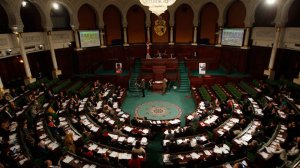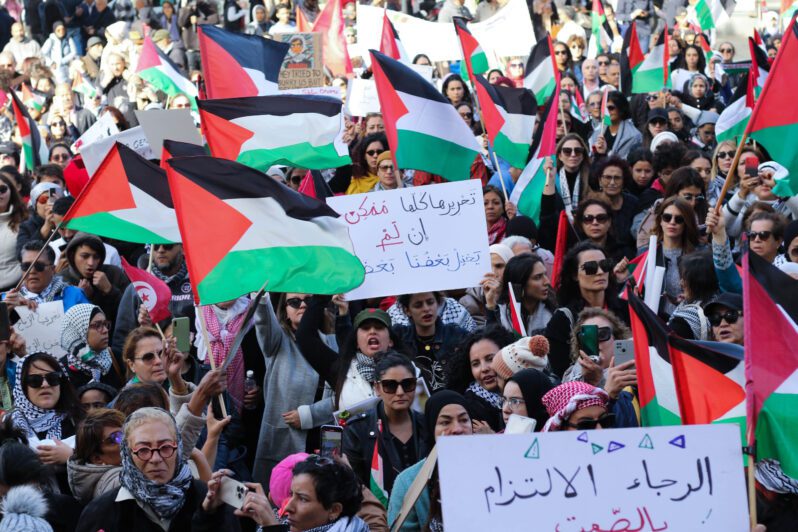Tunisia’s New Constitution: The Reconciliation of Religion and State

Throughout the drafting of Tunisia’s new Constitution, the relationship between Islam and the state’s laws and institutions represented a source of political and ideological contention – the effects of which were felt throughout the Tunisian political scene. On one side of the political spectrum were supporters of Islamist movements, who demanded that Sharia (Islamic law) be accorded a special status in the Constitution. On the other side, were supporters of secularist movements who pushed towards a complete separation between the state and religion, and who consider that separation is an essential condition for building a civil state.
Following their later conciliations, the struggle between these two political currents influenced the statutes of the Constitution that touch upon the question of religion and its relationship to the state. On the one hand, the Islamist-affiliated members of the National Constituent Assembly (NCA – which make up the majority of that body’s membership) managed to leave their mark, and securing a good standing of religion within the Constitution. On the other hand, the minority of NCA members who had called for a civil state also succeeded in imposing limits to the intervention of religion in state [affairs]. The ability of both sides to formulate a [common] vision of the relation between religion and state merits an examination to elucidate the particularities of this accomplishment, and its impact on the conception of this relation between religion and state.
The first chapter of the Constitution stipulates that Islam is the state religion, while the second chapter specifies that “Tunisia is a civil state, based upon citizenship, the will of the people, and the supremacy of law”. Both chapters conclude by stating that they are not subject to amendment. These particular chapters are immune from amendment because together, they constitute the basic foundation of the conception of a state based “upon a participatory, democratic system in the context of a civil state”, whose basic components are inspired “in the context of adherence to the objectives and teachings of Islam, characterized by openness, moderation, and the values and principles of universal human rights”.[1]
The first chapter to be agreed upon at the outset of the drafting process was the Constitution's first chapter specifying that Islam is the religion of the state. In order to avoid a split over the identity of the state, the various political factions involved reached an agreement that preserved the first chapter of the Republic’s first Constitution. In the eyes of scholars, this particular article has become a model example of how to conceive the relationship between religion and state.
Specifically, the content of the first chapter breaks completely with the idea of a theocratic state, but without eliminating all ties between the state and religion, as would be the case in a secular state. The statement that Islam is the state religion has provoked a range of objections from legal scholars, on the basis that the state is a legal [as opposed to natural] person with no religious belief, and that religion is a belief system that is attributable to people, not to a state. However, the conventional meaning of the expression “state religion”, as it occurs as a concept in comparable constitutions, requires a willingness to suspend these objections in order to discuss the effects of declaring Islam a state religion.
The State’s Islam is a Moderate One
Taken together, the preamble and 145 chapters of the Constitution show that Islam, as a state religion, is moderate in its approach. This characterization is based on the premise that the Tunisian people “adhere to the objectives and teachings of Islam in a way that is based upon openness and moderation”. Chapter 6 of the Constitution says the state is the guardian of religion.
By tying the particular way in which state religion is defined to the state’s responsibility in guarding -or attending to- religion as outlined in the Constitution, one might surmise that the state’s duties towards the officially recognized religion are multi-faceted. The first such duty of the state is to maintain a moderate application of Sharia and urge the use of ijtihad (interpretation), in order to seek the spirit of Sharia’s provisions and employ reason in interpreting the law’s intent.
Declaring Islam as a state religion thus entails the facilitation of a moderate religious discourse that eschews excessiveness, and encourages the use of reason to discern the lawmakers’ intent. The state is also called upon to preserve the conceptualization of religion as it is laid out in the Constitution. The state’s official mandate thus extends to include all institutions that contribute to the formulation of religious discourse, from educational institutions to places of worship, with the aim of “spreading the values of moderation and tolerance”.
Positing Islam as a common national value and mandating that the state espouse it and make the necessary public funds available imposes [certain duties on the state]. For instance, state institutions must ensure that religious discourse in places of worship is not employed in political propaganda or to partisan ends. All this is affirmed in the second paragraph of Chapter 2 of the Constitution.
Finally, the Constitution’s conceptualization of state religion calls for the preservation and protection from any violation, of that which is sacred. It also calls for the confrontation of extremist ideas whose spread could harm the fundamental tenets of moderation. By the same token, the Constitution confirms that “the state is obligated to protect what is sacred through banning takfir (the practice of accusing a person of apostasy) and incitements to hatred and violence”.
The Constitution does not prescribe a relationship between Sharia and state laws. It supports both a commitment to a civil state, as laid out in Chapter 2, as well as the idea that Sharia and its objectives are included among the sources for the substance of the law. The motivation for prohibiting the direct quotation of Sharia appears to be the avoidance of any equivocation regarding a commitment to the establishment of a democratic state, based on the concept of citizenship.
The constitutional drafting body -with a majority of members who are affiliated with the Islamist Ennahda party- was able to transcend the problematic of state and sharia. This was a practical embodiment of the notion that abiding by the teachings of Islam does not lead to extremism, but is premised on searching for the intent of Islamic laws that are open [to interpretation]. Transcending this problematic is also an indication of the evolution of the fundamentalist discourse towards doing away with the notion of the existence of a conflict between the secularism of the state and Islamic political thought.
Freedom of Belief and Freedom of Conscience: The Legacy of the 18 October Coalition for Rights and Freedoms
In dealing with matters of religious belief, the statutes of the Tunisian Constitution affirm a modern approach to the relationship between a state with an official religion, and human rights that specifically relate to religion. Chapter 6 of the Constitution stipulates “that the state guarantees freedom of belief, conscience, and religious practice”. In guaranteeing freedom of belief, the Constitution also specifically invokes the acknowledgement that religious communities may practice their religion freely and without restriction. Recognizing freedom of belief also requires recognizing individuals’ rights to embrace whichever beliefs they choose – including non-belief.
Furthermore, it appears that the Constitution’s commitment to protecting freedom of belief is connected to its protection of freedom of conscience. This is among the Constitution’s most important achievements in terms of fulfilling commitments to international human rights agreements. By enshrining “freedom of conscience”, the Constitution also enshrines the individual’s right to remain independent of the dominant social consciousness regarding matters of existence and of life itself, whether on the basis of ideology or intellectual thought. This freedom should be unrestricted, except when it might lead to a violation of what is sacred, or threaten to harm public order. There is a fear that broadening the concept of violating what is sacred, in particular, could lead to a limit of the freedoms of belief and conscience in practical terms. However, as the Constitution entrusts the judiciary with the responsibility to protect the freedoms of the public, it would appear that the judiciary is also responsible for maintaining the balance between freedom and maintaining order.
The history of the Tunisian national movement of resistance against the authoritarian state reveals that enshrining freedoms of belief and conscience is actually the culmination of years of efforts. Consensus among various political factions that these freedoms are necessary to the building of a democratic state dates back to 2005. In that year, different political groups opposed to the regime succeeded in uniting within a collective movement, namely, the 18 October Coalition for Rights and Freedoms. The group drafted a series of working papers in which the parties’ ideological differences were dissolved. The most important of these papers was their “Joint Declaration on Freedom of Belief and Conscience”.
That statement was an attempt to break with “remnants that continue to affect current legislation, as well as the practices that govern the relationship between the state and its citizens”. It signaled an effort to create a discourse around religion on the following basis: That the protection and preservation of freedom of belief do not conflict with the special stature occupied by Islam in the formulation of the distinguished and civilized national character of the Tunisian people.
“For this reason,” the paper argued “the advent of the universal principles of human rights, and the statutes of the international conventions that specifically concern personal freedoms and beliefs, takes place in creative interaction with the Arab-Islamic heritage of the Tunisian people. This interaction is one of the factors working towards reforming society and its transition into a modern society, based upon freedom and the rejection of all forms of commandment, coercion, and compulsion”.
After the fall of Tunisia’s authoritarian regime, members of the 18 October Coalition, who made up a majority of the NCAs membership, succeeded in realizing the commitments to which they had adhered to throughout their struggle against the former regime. This success was achieved despite the hesitancies on the part of some of their members, to discuss these issues during the debates over the Constitution.
Ultimately, it was through fulfilling those commitments that the statutes of the Constitution stood out. They offered a comprehensive approach to the relationship between religion and state within an Arab-Islamic context. This sends a message that extends beyond the local Tunisian context. It could offer a way to approach a new conceptualization of the matter in contrast to currently accepted understandings of the issue.
Nevertheless, there are some provisions of the new Constitution that seem to fall short of committing to freedoms of belief and conscience. One example is the stipulation that the president of the republic should be a Muslim (his religion should be Islam). This issue raises a key question, namely: is the recognition of an individual as a Muslim contingent upon his confessional affiliation, or is it necessary to consider a person’s beliefs and practices in order to determine his religion?
Furthermore, the oath sworn by members of the government as well as delegates to the Chamber of Deputies is an oath sworn to God. The freedom of belief of a person whose intellectual or ideological convictions go against the swearing of such an oath is thus discriminated against.
This article is an edited translation from Arabic.
References:
[1] Preamble of the Constitution.



